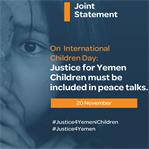Justice for Yemeni Children must be included in peace talks


Joint Statement for HRs Organizations on International Child Day
November 20th marks International Children's Day. This day serves as a poignant reminder that we must take a resolute stand to defend, promote, and celebrate the rights of Yemeni children. We, the undersigned, call on the parties to the conflict in Yemen and the international community to work towards securing justice for Yemeni children and enabling them to lead dignified lives, in accordance with the principles enshrined in the Convention on the Rights of the Child, to which Yemen is a signatory.
The children of Yemen have endured nine painful years of conflict. No party to the conflict can claim to have clean hands. The Saudi and UAE-led coalition, Ansar Allah (also known as the Houthis), the internationally recognized Yemeni government, the Southern Transitional Council, the UAE-backed Joint Forces, and Al-Qaeda in the Arabian Peninsula are all responsible for perpetrating violations against children.
In 2023, perpetrators in Yemen continued to commit human rights violations against children, especially the most vulnerable and marginalized, including indiscriminate ground attacks, drone attacks, sniper attacks, the use of landmines, sexual violence, recruitment and use of child soldiers, and the denial of humanitarian aid—abuses that are among those the UN has deemed “the six grave violations against children.” The conflict has also left 11 million childrenin need of humanitarian assistance.
Research conducted by of the Watch for Human Rights (Watch4HR) and Yemeni Coalition for Monitoring Human Rights Violations (YCMHRV), verified 250 cases of grave human rights violations against children documented during the period from January to September 2023. The violations included child recruitment (85 cases); killing and maiming (75 cases); attacks on schools and hospitals (45 cases); kidnapping (24 cases); sexual violence (14 cases); and obstructing access to humanitarian aid (7cases). The victims included internally displaced individuals and Muhamasheen (a marginalized ethnic group in Yemen). The vast majority of the victims (79%) were boys. Most of the violations were perpetrated by the Houthis (84%), while 14% were perpetrated by the Yemeni government and the Southern Transitional Council, and 2% were perpetrated by unidentified officials.
The UN Secretary-General's 2022 report on children and armed conflict also documented 1,596 grave violations against children in Yemen, including child recruitment, killing and maiming, sexual violence, kidnapping, attacks on schools and hospitals, and obstruction of humanitarian aid.
The children of Yemen are having their futures stolen as parties to the conflict launch attacks on infrastructure and education. Over two million children are unable to attend school, as nearly 3,000 schools have been destroyed or repurposed for military use and the Red Cross reports that a fifth of schools have been closed. Ansar Allah has also used schools, mosques, and summer camps to recruit children to join their forces. Although the United Nations has signed action plans with Ansar Allah and the Yemeni government to end their recruitment and use of children in their armed forces, both Ansar Allah and forces allied with the Yemeni government continue to recruit children, according to the research conducted by the Yemeni civil society organizations.
Violations against Yemen’s children have persisted in the absence of an international accountability mechanism that could deter parties to the conflict from abuses.
Yemeni civil society organizations eagerly anticipate a peace agreement, and hope that all parties, including the Yemeni government, will participate and fulfill their historical responsibilities to protect children and what remains of their homeland. However, for the current negotiations to be effective in establishing a lasting peace in Yemen, these talks must be inclusive of civil society, and should ensure that transitional justice and accountability are central to the discussion.
The undersigned organizations make the following recommendations:
Signatories: